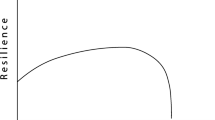Abstract
In the last decade the systems approach to agricultural research has begun to subsume the older reductionist approaches. However, proponents of the systems approach often accept without critical examination a number of features that were inherited from previously accepted approaches. In particular, supporters of the systems approach frequently ignore the ironies and tragedies that are a part of all human endeavors. They may also fail to consider that all actual systems are temporally and spatially bounded. By incorporating such features into a systems perspective, it becomes possible to consider them as involving the manipulation of things, the reconstruction of institutions, and the reformulation of policies in accordance with democratic goals and objectives as part of a single web of interrelationships.
Similar content being viewed by others
References
Arnon, Isaac. 1968.Organisation and Administration of Agricultural Research. Amsterdam: Elsevier.
Bailey, Liberty Hyde. 1910. “The Better Preparation of Men for College and Station Work,” Pp. 25–32 inProceedings of the 23rd Annual Convention of the Association of American Agricultural Colleges and Experiment Stations. Portland.
Bawden, Richard J., Robert D. Macadam, Roger Packham, and Ian Valentine. 1984. “Systems Thinking and Practices in the Education of Agriculturalists,”Agricultural Systems. 13: 205–225.
Black, Max. 1966.Models and Metaphors. Ithaca, NY: Cornell University Press.
Busch, L., J. L. Silver, W. B. Lacy, C. S. Perry, M. Lancelle, and S. Deo. 1984.The Relationship of Public Agricultural R&D to Selected Changes in the Farm Sector: A Report to the National Science Foundation. Lexington: University of Kentucky Agricultural Experiment Station.
Busch, Lawrence, William B. Lacy, Jeffrey Burkhardt, and Laura R. Lacy. 1990.Plants, Power, and Profit: Social, Economic, and Ethical Consequences of the New Plant Biotechnologies. Oxford, Basil Blackwell. Forthcoming.
Dahlberg, Kenneth A. 1980.Beyond the Green Revolution. New York: Plenum.
Dalton, G. E., ed. 1985.Study of Agricultural Systems. London: Applied Science Publishers.
Danbom, David B. 1979.The Resisted Revolution: Urban America and the Industralization of Agriculture, 1900–1930. Ames: The Univ. of Iowa Press.
Davenport, Eugene. 1919. “Wanted: A National Agricultural Policy,” Address of the President of the Association of American Agricultural Colleges and Experiment Stations. Urbana: University of Illinois.
Dillon, John L. 1976. “The Economics of Systems Research,”Agricultural Systems. 1(1): 5–22.
Drake, Stillman. 1978.Galileo at Work: His Scientific Biography. Chicago: University of Chicago Press.
Duckham, A. N., and G. B. Masefield. 1970.Farming Systems of the World. London: Chatto and Windus.
Faki, Hamid. 1982. “Disparities in the Management of Resources Between Farm and National Levels in Irrigation Projects, Example of the Sudan Gezira scheme,”Agricultural Administration. 9(1): 47–59.
Gusfield, Joseph R. 1967. “Tradition and Modernity: Misplaced Polarities in the Study of Social Change.”American Journal of Sociology. 72(January): 351–362.
Husserl, Edmond. 1970.The Crisis of the European Sciences and Transcendental Phenomenology. Trans. by David Carr. Evanston: Northwestern University Press.
Keller, Evelyn Fox. 1985.Reflections on Gender and Science. New Haven: Yale University Press.
Knorr-Cetina, Karin D. 1981.The Manufacture of Knowledge. Oxford: Pergammon Press.
Lang, Candace D. 1988.Irony/Humor: Critical Paradigms. Baltimore: Johns Hopkins University Press.
Latour, Bruno. 1987.Science in Action. Milton Keynes, England: Open University Press.
Lipton, Michael and Richard Longhurst. 1989.New Seeds and Poor People. Baltimore: Johns Hopkins University Press.
Lowrane, Richard; Benjamin R. Stinner and Garfield J. House, eds. 1984.Agricultural Ecosystems. New York: John Wiley and Sons.
Machiavelli, Niccolo, 1985.The Prince. Translation by Harvey C. Mansfield, Jr. Chicago: University of Chicago Press.
MacIntyre, Alasdair. 1984.After Virtue. Notre Dame, IN: University of Notre Dame Press. Second Edition.
Merriam-Webster. 1987.Webster's Ninth New Collegiate Dictionary. Springfield, MA: Merriam-Webster, Inc.
Muecke, D. C. 1982.Irony and the Ironic. New York: Methuen.
Radnitzky, Gerard. 1973.Contemporary Schools of Metascience. Chicago: Henry Regnery, Third edition.
Ricoeur, Paul. 1974.The Conflict of Interpretations. Evanston, IL: Northwestern University Press.
Rosenberg, Charles E. 1976.No Other Gods. Baltimore: Johns Hopkins Press.
Sagoff, Mark. 1988.The Economy of the Earth: Philosophy, Law, and the Environment. Cambridge: Cambridge University Press.
Schutz, Alfred and Thomas Luckmann. 1973.The Structures of the Life-World. Evanston, IL: Northwestern University Press.
Shapin, Steven and Simon Schaffer. 1985.Leviathan and the Air-Pump: Hobbes, Boyle, and the Experimental Life. Princeton: Princeton University Press.
Sowell, Robert and David Miller. 1986. “Chatham River: A Case Study.” Pp. 5d. 138–5d. 163 inSystems Approaches to Food and Agricultural Problems. New Brunswick, NJ: National Agricultural and Natural Resources Curriculum Project.
Spedding, C. R. W. 1979.An Introduction to Agricultural Systems. London; Applied Science Publishers.
White, Lynn, Jr. 1962.Medieval Technology and Social Change. Oxford: Clarendon Press.
Wilson, Jim. 1988.Changing Agriculture: An Introduction to Systems Thinking. Kenthurst, Australia: Kangaroo Press.
Additional information
Lawrence Busch is Professor of Sociology at Michigan State University. His current research focuses on the social, ethical, and political questions surrounding the conservation of plant germplasm. He has published several books and numberous papers on various aspects of domestic and international agricultural research policy.
I would like thank Katherine L. Clancy for her comments on a previous draft of this paper.
Rights and permissions
About this article
Cite this article
Busch, L. Irony, tragedy, and temporality in agricultural systems, or, how values and systems are related. Agric Hum Values 6, 4–11 (1989). https://doi.org/10.1007/BF02217808
Issue Date:
DOI: https://doi.org/10.1007/BF02217808




